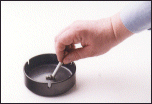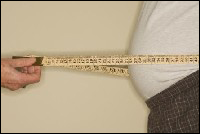Healthy Living for a Healthy Heart
The Department of Cardiovascular Medicine strongly recommends that you should undertake a lifestyle that is healthy and good for your heart. The following are five recommendations that you should follow to have a healthy heart.

1. Do not smoke
Smoking is one of the major causes of cardiovascular disease. People who smoke are almost twice as likely to have a heart attack as people who have never smoked. If you are a smoker, stopping smoking is the single most important step you can take to reduce the risk of having a heart attack and to live longer. It can also increase the risk of developing several different types of cancer and is the main cause of some lung diseases.
The following are some ideas on how you can try to give up smoking:
- Make a date to give up, and stick to it! Throw away all your tobacco, lighters and ashtrays.
- Draw up a action plan. Think about what could help you stop smoking, such as using a nicotine-replacement product, and have it ready before the date you plan to quit.
- Keep busy . Try to change your routine, and avoid the places where you usually buy cigarettes.
- Get support. Let your family and friends know you are quitting. Some people find that talking to friends and relatives who have stopped can be helpful.
- Treat yourself. If you can, use the money you are saving by not smoking to buy yourself something special.

2. A healthy diet
A healthy diet can help to reduce the risk of developing heart disease. If you already have coronary heart disease, eating a well balanced diet can also help protect your heart from further problems. A healthy diet contains:
- Plenty of fruit and vegetables - You should aim to eat at least five portions of fruit and vegetables each day. These can be fresh, frozen, dried or tinned.
- Lots of starchy foods such as wholegrain bread, pasta and rice
- Foods low in fat (especially saturated fat), salt and sugar - Too much fat in your diet, particularly saturated fat, can increase your blood cholesterol levels which can increase your risk of developing coronary heart disease while having too much raises your blood pressure, increasing the chance of developing coronary heart diesease.
- Alcohol - Too much alcohol can damage the heart muscle, increase blood pressure and may also lead to weight gain, all of which are contributing factors of cornary heart diesease.

3. Keeping active
You should aim to build up to at least 30 minutes of moderate intensity physical activity, which can include going swimming, doing an exercise class or things such as walking, gardening and climbing stairs, five or more days a week. During moderate exercise you should be breathing more heavily than normal and feel slightly warmer.
If 30 minutes seems too much for you at the moment, build up slowly. Here are some suggestions:
- Start with five minutes exercise at least three times a day and start slowly at a level that suits you
- Gradually build up the time and frequency until 30 minutes feels easier
- Choose a variety of activities and ones you enjoy
- Try to do something every day.
You are never too old or too unfit to start doing something. The greatest increase in health benefit is experienced by inactive people who start to take regular moderate physical activity.
4. Control your blood pressure
Blood pressure is the pressure of the blood in your arteries. You need a certain amount of pressure in your body to keep the blood flowing.
If you have high blood pressure, it is essential to control it. Even reducing your blood pressure by a small amount can lower your risk of problems in the future. To reduce your blood pressure, or prevent it from getting high, you can do the following things.
- Do more physical activity
- Keep to a healthy weight
- Cut down on salt
- Cut down on alcohol
- Eat more fruit and vegetables
For more information on blood pressure, please visit www.bloodpressureuk.org.uk.

5. Maintaining a healthy weight for you
Carrying extra weight as fat can greatly affect your health. Excess body fat is not just harmless tissue that you carry around as extra padding but it also produces hormones and other substances that can put you more at risk of ill-health. Being very overweight can put you at greater risk of several serious and possibly life-threatening medical conditions including coronary heart disease and diabetes.
To lose weight, you should undertake an effective weight loss plan involving regular physical activity and a healthy eating plan (see above). Also, avoid crash diets as these are not a healthy option and you may find it difficult to keep the weight off.
A measurement as to whether you are overweight is to work out your Body Mass Index (BMI). To work out your BMI, you need to take your weight in kilograms (kg) and divide it by your height in metres (m). Then divide the result by your height in metres (m) again.
For example, if you weigh 70kg, and you're 1.75m tall, your BMI would be 22.9 (70/1.75 = 40 and 40/1.75 = 22.9).
You can also click here to calculate your BMI.
Last updated23 Apr 2024

